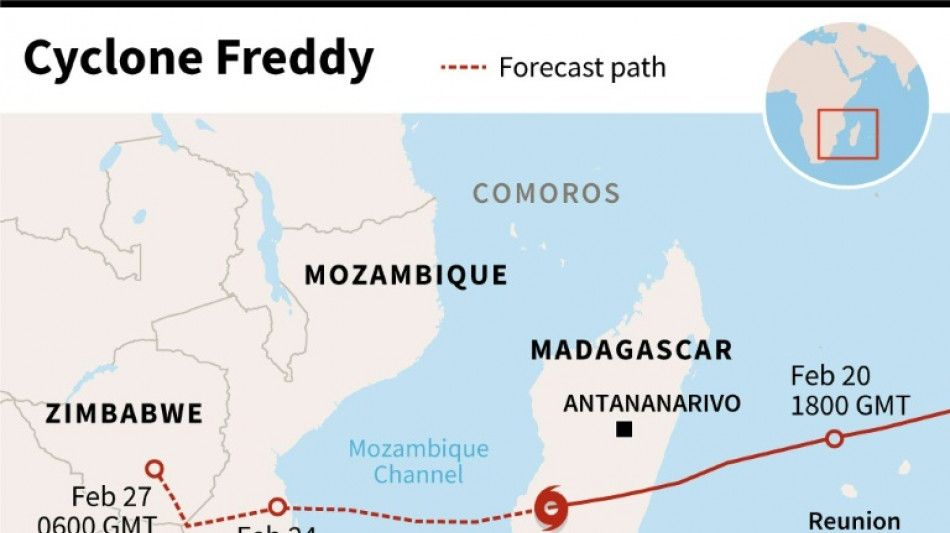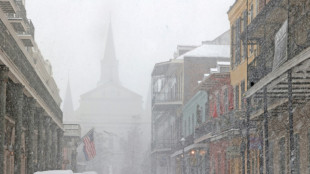

Four dead after Cyclone Freddy crosses Madagascar
A powerful cyclone battered Madagascar on Wednesday, killing four people as it barrelled towards Mozambique but leaving less devastation in its wake than feared, emergency officials said.
Authorities gave a provisional toll of four dead after Cyclone Freddy made landfall on the Indian Ocean island late Tuesday, packing winds of around 130 kilometres (80 miles) per hour.
Around 16,600 people were affected and around 4,500 homes flooded or damaged, the National Risk Management Office (BNGRC) said, giving an updated assessment.
France's weather service Meteo-France said Freddy weakened as it tracked across Madagascar, dropping to an average wind speed of 55 kph.
But, the agency warned, the storm would pick up strength from the warm Mozambique Channel as it headed towards the African mainland.
Freddy had developed into one of the biggest cyclones in recent years to threaten Madagascar, which is typically lashed several times during the annual November-April storm season.
In the end, it brought less rain than feared but still ripped roofs off buildings and flattened rice fields and fruit trees.
It made landfall north of Mananjary, a coastal town of 25,000 people that remains devastated by last year's Cyclone Batsirai, which killed more than 130 people.
"It's a dry cyclone compared to Batsirai, so it brought fewer rains, but the winds were stronger, this is why infrastructure was badly affected," risk management senior official Faly Aritiana Fabien told AFP.
"The recorded damage is almost only related to the wind."
- 'Can't take this' -
As Freddy closed in after brushing Mauritius and the French island of La Reunion without causing major damage, the authorities put in place an array of measures.
Several regions on Tuesday suspended school classes for the rest of the week and at least 8,000 people were evacuated as a precaution in Mananjary.
By daybreak, residents there were out on the streets to assess the damage.
Despite thousands of sandbags used to reinforce roofs, metal sheets and electric cables were strewn on the ground by the force of the wind.
Pascal Salle sobbed as he assessed the damage after hardly recovering from last year's Cyclone Batsirai.
"I didn't think there was a more powerful cyclone than Batsirai," he said. "My fence is down, my 1,000-litre (around 250-gallon) plastic water tank was smashed against the neighbour's wall".
A window was ripped off his house and the garden transformed into "a sandy field", he said.
"I can't take this every year, it's not possible," he said.
But the Red Cross spokesperson in Mananjary, Mialy Caren Ramanantoanina, said damage was not as bad as with Batsirai.
"No immediate large-scale disaster," said Joaquin Noterdaeme of the French aid group Doctors of the World (Medecins du Monde).
- Mozambique next -
Freddy is the first cyclone and the second tropical weather system to hit during Madagascar's current season, the UN's Office for the Coordination of Humanitarian Affairs said.
The storm began to brew in the first week of February off the northwest of Australia and south of Indonesia and is now in its third week trekking across the Indian Ocean.
At its height, Freddy was a "supercyclone", with average wind speeds of 220 kph and gusts of 320 kph, said Meteo-France's cyclone specialist for the Indian Ocean, Sebastien Langlade.
The UN's World Food Programme had estimated more than 2.3 million people in Madagascar could be affected.
The cyclone coincides with a months-long drought in the southern part of the island that has inflicted widespread hunger.
Freddy is expected to make landfall in Mozambique on Friday as a likely tropical storm, bringing the risk of pounding rain, according to forecasts.
Heavy rain could also hit parts of Zimbabwe and South Africa at the weekend.
O.F.MacGillivray--NG



